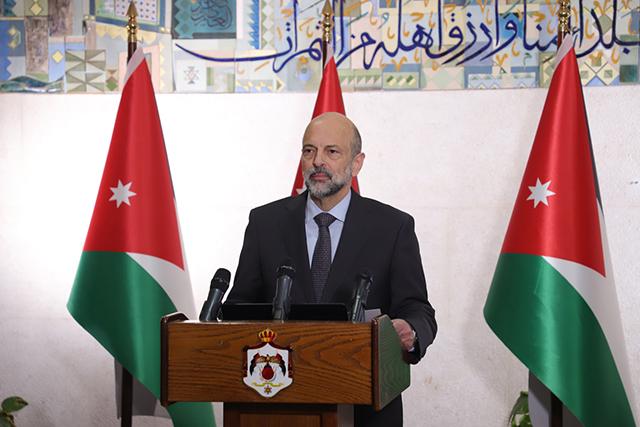COVID-19
Gov’t issues Defence Order No. 9 to support non-working employees, employers, daily wage workers

Responding to the effects of the coronavirus crisis on the living conditions of citizens and the conditions of the private sector, the government has announced Defence Order No. 9, which outlines a programme for protecting businesses, freelance workers and daily wage workers.
During a press conference broadcast live from the Prime Ministry on Thursday, Prime Minister and Minister of Defence Omar Razzaz said that under the new defence order, the programme, which is expected to benefit some 400,000 Jordanian households, will be implemented in cooperation with the Social Security Corporation (SSC).
According to SSC Director General Hazem Rahahleh, who announced three programmes under the defence order during the conference that aim at enhancing the job stability and sustainability of the private sector in light of the coronavirus crisis, the first programme, Tadamun (solidarity) 1, will cover institutions that are already covered by the SSC.
Jordanians, Gazans and children of Jordanian women married to non-Jordanians will benefit from this programme, with employees receiving 50 per cent of their salaries provided that the amount ranges between JD165 and JD500. The employer will pay 20 per cent, with a maximum of JD250, Rahahleh said.
The second programme, Tadamun 2, targets companies that are not subscribed to the SSC or whose subscriptions are less than 12 months. Under the programme, each employee will receive JD150, the director general said.
Rahahleh said that the third programme allows subscribers to receive advance payments and their temporary unemployment credits from the corporation, noting that the SSC will start receiving applications on Tuesday.
Social Development Minister Basma Ishaqat said that this programme is the “biggest protection plan ever” for daily wage workers, with 200,000 families expected to benefit from its first phase.
Daily wage workers whose jobs have been affected by the government measures to curb the spread of COVID-19 in the Kingdom will be able to submit their applications immediately for 10 days through the bread subsidy website www.reg.takmeely.jo, to which a special window has been added to support these workers, Ishaqat said.
“Families with two members will receive JD70 for one month, while households with more members will receive JD136,” the minister said, adding that the total monthly cost of this support stands at JD27 million and may be disbursed again if damage persists in the future.
Disbursal of the money to beneficiaries will start on Wednesday and continue for 10 days, Ishaqat said.
Also speaking during the conference, Labour Minister Nidal Bataineh said that theprotection programme aims at supporting employees whose work has been suspended at companies licensed to work, employees whose work has been suspended at companies whose operations are completely halted and daily wage workers, adding that the Defence Order also aims at helping employers pay salaries to their employees.
Bataineh noted that 90 per cent of private sector facilities have paid the salaries of their employees for March and 80 per cent of employees who were laid off during the crisis returned to their jobs.
According to the prime minister, “all indicators show” that the coronavirus pandemic will not disappear in days, weeks or even months, which “paves the way for a new adjustment and adaptation phase”.
“Every business will face challenges if the situation remains the same,” Razzaz said, noting that some establishments can survive for two or three weeks before they start facing real challenges.
The government is planning to gradually reopen more sectors, a move that is a priority for the next phase, during which additional sectors will resume operations with various capacity levels, he said.
Razzaz also noted that the government will cooperate with the Central Bank of Jordan and other banks in the Kingdom to launch a programme to provide loans to micro, small- and medium-sized enterprises with interest rates of up to 2 per cent and a grace period of one year to help these institutions survive the crisis.
Major national companies will also be supported through an investment fund established by the government, the CBJ, banks and national funds, which will provide medium- and long-term support.
“Protecting our national economy will require billions, and it is a priority,” the prime minister said.
He also noted that the government has issued some 220 decisions since the emergence of the coronavirus, adding that Jordan was among the first countries to adopt direct measures to curb the spread of the disease.
Minister of State for Prime Ministry Affairs Sami Daoud, for his part, said that the Cabinet held a meeting on Thursday and made decisions to deduct from the salaries of senior officials to help support the Himmat Watan fund, the “Khair” account at the Social Development Ministry, the Health Ministry and those affected from the coronavirus crisis.
The decisions include deducting 40 per cent of the prime minister’s salary and 30 per cent of the salaries of ministers, chief commissioners and those with the same rank, Daoud said.
Under the decisions, 10 per cent will be deducted from the salaries of secretaries general and employees whose salaries exceed JD2,000, the minister added.
The decisions also stipulate halting several allowances.
Also at the conference, Minister of State for Media Affairs Amjad Adaileh said that His Majesty King Abdullah had donated to the Ministry of Health and offered a “generous financial donation” for the daily wage workers programme.
Adaileh added that His Majesty’s donation was among the largest to be made during the government’s campaigns over the past two weeks.